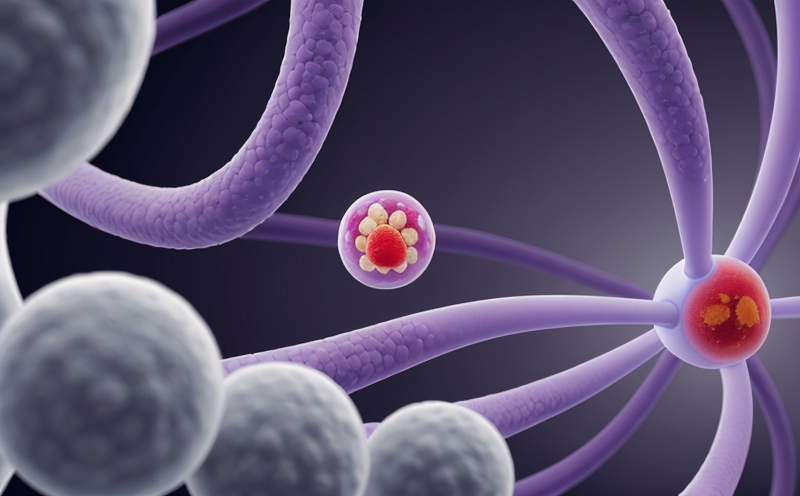Drug-Induced Cancer Biomarker Testing in Rodent Toxicology
In the realm of drug development and toxicological evaluation, understanding how potential therapeutics interact with biological systems is paramount. One critical aspect involves assessing the risk of carcinogenicity, which can be evaluated through detailed biomarker testing during rodent toxicity studies. This service focuses on identifying and measuring specific cancer-related biomarkers that may indicate a drug's potential to induce tumors.
The process begins with carefully selecting appropriate strains of rodents for their genetic predispositions towards certain diseases or conditions. The animals undergo controlled exposure to the investigational agent, followed by comprehensive analysis at various time points post-administration. This allows researchers to observe any alterations in gene expression patterns, protein levels, or other indicators associated with carcinogenesis.
Advanced analytical techniques such as qPCR (quantitative Polymerase Chain Reaction), Western blotting, immunohistochemistry, and ELISA play crucial roles in quantifying these biomarkers accurately. By comparing baseline values against those observed post-treatment, scientists can pinpoint significant changes indicative of adverse effects.
ISO 10993-25 specifies guidelines for assessing subchronic toxicity; however, our service extends beyond mere compliance by providing deeper insights into the mechanism underlying any detected abnormalities. Our state-of-the-art facilities utilize cutting-edge equipment like mass spectrometers and flow cytometers to ensure precision and reliability throughout every step of the analysis.
The results from this testing are invaluable for regulatory submissions, guiding further development or potentially steering researchers toward alternative approaches if concerning trends emerge early on. This proactive approach not only enhances patient safety but also streamlines the drug approval process, ultimately accelerating treatments to market faster.
Our team of experts ensures that all aspects of the study adhere strictly to Good Laboratory Practices (GLP), ensuring data integrity and reproducibility. We employ rigorous quality controls at each stage, from sample collection through final report generation, guaranteeing accurate results that can be confidently relied upon by stakeholders.
Understanding the nuances behind cancer biomarkers is essential for developing safer medications while minimizing risks associated with unintended side effects like neoplasms. By leveraging advanced technologies and adhering to stringent standards, we provide robust evidence supporting informed decision-making in drug discovery and development pipelines.
Industry Applications
Cancer biomarker testing plays a vital role across various sectors within the healthcare industry. Pharmaceutical companies rely heavily on these tests early in their R&D stages to identify promising compounds with minimal toxicity profiles, thereby reducing costly failures later in clinical trials.
Biotech startups also benefit significantly from this service as they often lack extensive resources and infrastructure needed for large-scale preclinical studies. By partnering with reputable laboratories like ours, these organizations can access specialized expertise without compromising on quality standards.
Regulatory agencies frequently request detailed reports based on cancer biomarker data when evaluating new drug applications. Having reliable, comprehensive testing results strengthens the case presented during these evaluations, increasing chances of approval.
Hospitals and academic institutions use this information to refine treatment protocols for existing conditions or explore novel therapeutic strategies targeting specific patient populations more effectively.
Why Choose This Test
Selecting the right cancer biomarker test is crucial given its ability to predict adverse outcomes accurately. Our service offers several advantages over traditional methods:
- Precision: Utilizing state-of-the-art technology ensures highly accurate measurements, reducing variability and improving confidence in results.
- Comprehensive: Extends beyond basic assessments to include mechanistic insights into the underlying processes contributing to potential carcinogenicity.
- Efficiency: Streamlines timelines by identifying risks early on, allowing for rapid course correction if necessary.
- Regulatory Compliance: Adherence to GLP principles ensures that all procedures meet stringent quality control requirements recognized globally.
The combination of these factors makes our service an indispensable tool in ensuring safe and effective pharmaceutical products reach the market efficiently.
Use Cases and Application Examples
This testing is particularly relevant when evaluating chemotherapeutics, immunomodulators, or other agents known to exert strong effects on cellular metabolism. Here are some practical examples:
- Cisplatin: A widely used platinum-based chemotherapy drug often associated with nephrotoxicity and ototoxicity. Through cancer biomarker testing, we can assess its impact on DNA repair mechanisms and oxidative stress pathways.
- Nivolumab: An anti-PD-1 monoclonal antibody designed to enhance the body’s immune response against tumors. Our tests help monitor T-cell activation markers and cytokine profiles following treatment.
- Tislelizumab: A PD-1 inhibitor used in various solid tumors. Biomarker analysis focuses on evaluating changes in tumor microenvironment components, such as angiogenic factors and immune cell infiltration indicators.
In each case, the goal is to understand not only whether a drug causes harm but also how it might do so, enabling targeted interventions where needed.





